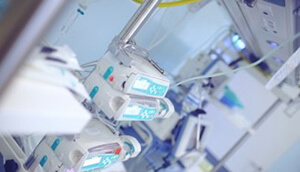
The Ricky Hendrick Center for Intensive Care sees 700-800 annual admissions. We have a Level I Pediatric Trauma designation and see all pathophysiology, including traumatic brain injury, multisystem organ failure, solid organ transplant, bone marrow transplant, severe septic shock, ARDS and renal failure, utilizing all methods of critical care support including ECMO, high frequency oscillatory ventilation (HFOV), neutrally adjusted ventilatory assist (NAVA), and continuous renal replacement therapy (CRRT). We are ranked in the top 5% nationally for severity of illness seen in our PICU. There is 24-hour in-house attending coverage of the PICU.
The PICU team is comprised of two pediatric residents, one or two emergency medicine residents, medical students and an attending ICU physician. PICU Rounds are multidisciplinary featuring the intensive care physician, charge nurse, respiratory therapist and pharmacist as well as the bedside nurse and the patient’s family. Our residents complete 2 months of PICU, one as a PL-2 and one as a PL-3.
The objective of this course is to expose students to patient care in the Pediatric ICU setting, with emphasis on diagnostic reasoning and medical decision making in a high complexity and acuity patient population.
All students will be directly supervised by the Pediatric ICU attending on duty along with the Pediatric ICU residents and APPs. Students will participate as an integral part of the inpatient care team. Students will assume supervised responsibility for patient admission, evaluation, diagnostic testing, initiation and subsequent management, and be exposed to patient-care issues such as transitions of care, end of life decisions, patient disposition, and family health care dynamics.
Students will be responsible for working in cooperation with the consulting physicians, nurses, and other healthcare professionals in the coordination of care and medical management. Students will be responsible for being first call for patient care issues and with supervision will place orders and write the daily progress note. Responsibility for supervision of students will lie with the upper-level house staff and faculty. Students will be exposed to and have the opportunity to care for patients with a wide variety of chronic and acute illnesses. Students may be exposed to and have the opportunity to observe/participate in/perform a variety of procedures, such as arterial line placement, central line placement, endotracheal intubation, thoracentesis, and lumbar puncture. Each student’s experience will be unique, predicated on the patients for whom she/he cares for during the rotation.
